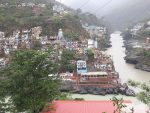
Legs and Wheels – On Roads Wheeling towards Badrinath
Team Udayavani, Nov 27, 2018, 2:03 PM IST

Travel is, of course, a fantastic activity and traveling in the Himalayan terrains is even better. It is an insatiable experience. Every place has an interesting tale to narrate. The Surroundings are endowed with the best scenery; each frame only gets better than the previous one as we move along. A traveler is bound to eagerly wait for that next enchanting sight which the next curve of the road is about to offer! It leaves you wanting for more while rekindling your curiosity.
After the day filled with excitement and contentment at Kedarnath followed with visits to Ukhimath and Kalimath, our well-rested bodies and minds were all set to move towards next set of ranges of our Char Dham yatra. We left Gupta Kashi early morning at 6 am as we had a 186 km drive ahead to reach the next abode of Lord “Badrinath”. We also had an important stop to make at Chopta which is about 66 km from Guptakashi.

Classic Chopta and Challenging Tunganath
As we traveled on the terrains of National Highway 107, we noticed that the roads were well-maintained. We saw workers by the roadside constantly immersed in clearing the roads, buried beneath fresh landslides and soil erosion. I started wondering, ‘Why is the travel to these religious places, particularly in the Himalayas, suggested during the last leg of one’s life journey?’ Google failed to provide me with an answer as there was a problem with network connectivity. So I turned to my personal “google”, my husband, whom I dearly call ‘Kanta’, for an answer. “That thought was suitable for those days when traveling in these areas was not considered safe and also was not easy”. Before I could exclaim “Oh, this is such a common answer”, he continued, “During our travel, you have seen a lot of young people, which indicates that times have changed and people are traveling even at a young age to these places. But, for a spiritual travel, it is always good if the individual’s mind and body are ready to remain detached from materialistic wants. Anyway, you don’t worry about all those things. You have wheels embedded in your legs and you keep traveling”, was his thoughtful reply. My “google” had managed to convince me.
The travel continued and we became lost enjoying the immaculate dressing sense of Mother earth. It was 8.30am when we reached Chopta, popularly called as ‘mini Switzerland of India’. With its exquisite velvety meadows, Chopta is largely considered as a base camp to trek Tungnath, one amongst the ‘panch kedars’. Positioned at an elevation of 2,680 mts above the sea level, this village is blessed picturesque. Snuggled in Himalayan Valley, Chopta offers a beautiful sight of Trishul, Nanda Devi, and Chaukhama peaks. “We stop here for breakfast if you want to trek ‘Tungnath’ you may please do”, announced Uday, our tour guide and driver.
We sat peacefully on the slopes of the ranges trying to absorb as much we could. Hot ‘parantas’ and brewing ginger tea found us, without any efforts from our side. All thanks to the friendly ‘Dhaba’ owner. “I think I will trek Tunganath… How about you”? asked my husband after a while.

How to reach Tunganath?
We can ascend either by foot or on a horse to reach the Tunganath temple. “ Madamji …aap se nahi hoga” ( Madam you can’t), “steps are not even..”, Uday cautioned me. The horse owner also said that the journey will not be easy for me even on a horseback. Though my heart wanted to ascend the ranges and visit the temple, I chose to listen to my mind, as I knew my health conditions. I decided against taking the risk and stayed back at Chopta, while my ‘fitter half’ went ahead to trek 3680 mts to the Tunganath temple.
A further Trek from Tunganath temple will eventually lead you to the mystical Chandrashila at the height of 4130 m. Since it takes about 3-3.30 hours to reach Chandrashila or Deoria Tal, my husband promised me that he would not go there. Pony or horse services are available to cover the stretch and they change about Rs.4,000. You can even opt for this service one-way.
Chopta also has some small but nice places to lodge. The majority of travelers, however, stay at Ukhimath, while some even start their trek from Haridwar or Rishikesh. usually, people go to Chopta and then proceed to Tunganath and Chandrashila while Others ride privately owned vehicles after reaching Chopta and trek to Tunganath and further. I saw families inclusive of small children, happily jumping out of their vehicles and getting ready for the trek.
This probably is the first time I cursed myself severely for not keeping myself fit enough for the trek. I had no option but to wait. Honestly, to explore a place like the Himalayas you need a strong pair of knees. I have seen women older to me, during my travel to the western countries, easily climbing the stairs and peddling bicycles. I feel a majority of Indian women, fail to take care of our health. We should and I insist.
Those, who come prepared for the exclusive trek, proceed further to reach Chandrashila, actually from where you get a better view of ranges of Nandadevi, Trisul, Bandarpunch, Chaukhamba including the peak Kedar. Chandrashila actually means “Moon Rock”, located at a height of about 3,700 meters above sea level, is tagged with many mythological stories. Among many stories that it is believed to be a place where Lord Rama meditated after defeating the Ravana to remove ‘brahmahatya dosha’ and that moon-god Chandra spent time here in penance are important.
I must also add here that package tours largely skip trek trip to Tunganath. They stop briefly at Chopta and proceed further.

Nestling on the slopes of Chopta
I have no option but to wait for my husband to come back. With those extra splendid hours in front of me, I asked Uday to drive me back to Chopta village, which is just 3kms away from the trekking point. Filled with tall pine, deodar and rhododendron trees, Chopta village is not only rich in flora but has an interesting fauna including rare species of birds and musk deer. People do not travel on this road after dusk, as the sound of the vehicles and lights will disturb the animals. Chopta being less explored, this a part of Kedarnath Wildlife Sanctuary continues to remain clean and quiet.
It was around 9.30 am by then, but I could still hear the chirping of birds. Reaching their I chose a right spot to spread myself luxuriously and comfortably on the lush green grass for the next three-plus hours without being disturbed. I got lost in its enchanting beauty of meadows and evergreen forests. As I drained my second cup of tea, my heart continued to sing and my soul danced in tune with nature. I had lost track of time.
Uday came quietly and stood beside me …by now I knew what that meant, it was time to leave. We picked up my exhilarated husband and continued our journey to Badrinath. It was about 1.30pm by then.
Story of Tunganath

One of Panch Kedar temples designated to Lord Shiva, Tunganath is situated on a steep range and is relatively a tough trek. Situated in the Garhwal Himalayan region in Uttarakhand, the place has a direct link to the story of ‘Pandavas’. A quick recollection to the mythological tale, behind ‘Panch Kedar’ credits to Bhima for trying to catch the cow, which is identified as a disguised form of Lord Shiva, who is in act of disappearing. The mighty Bhima manages to catch the which incidentally got torn into five parts that appeared in five or ‘Panch’ locations of the Kedar Khand region of the Himalayas and came to be known as ‘ Panch Kedar’. Pandavas are also credited with building the temples dedicated to Lord Shiva in the form of Kedarnath, Tungnath, Rudranath, Madhymaheshwar, and Kalpeshwar. it is believed that the Pandavas meditated at Kedarnath and attained salvation. The path of they took for Swargarohini is near Badrinath.
Tunganath, as explained by my husband, provides a 360-degree vision of the enchanting Himalayas. It is a ‘sidda peetha’. “The calmness of the place and richness of the surroundings motivates one to sit there for deep penance,” he said. Devotees can directly offer pious water to Lord Shiva and sufficient facilities for the same are provided at the spot. The temple is like any other Himalayan temple and has a resemblance to Kedarnath temple. Though the feedback given by travelers is that it is an easy trek, my husband found said it was quite challenging as it was as steep as Yamunotri.
‘O’ Traveller Please Remember
Do not forget to carry your medicine and warm clothes when you are traveling in the ranges of Himalayas. Eat healthily and drink safe water. Even if you have hired a vehicle for yourself, it is advised not to travel late night in the terrain areas as the journey is full of uncertainties. Do not drive fast or overtake.
We were on the roads again, moving towards Badrinath. After 4 long hours of the drive, we reached Badrinath. It was 6.30 pm. Drive to Badrinath and experience at Badrinath is yet another exclusive experience.
Dr. Nandini Lakshmikantha
Udayavani is now on Telegram. Click here to join our channel and stay updated with the latest news.
Top News

Related Articles More
MUST WATCH
Latest Additions

Gadkari hails Mahayuti, says it prioritised development under PM’s leadership

None of Adani portfolio cos subject to any legal case: Group CFO on promoter indictment in US

Congress’ Annapoorna wins Sandur Assembly bypoll in Karnataka

Congress’ E Annapoorna wins Sandur Assembly bypoll in Karnataka

20 injured in multiple collisions in Karnataka
Thanks for visiting Udayavani
You seem to have an Ad Blocker on.
To continue reading, please turn it off or whitelist Udayavani.
























